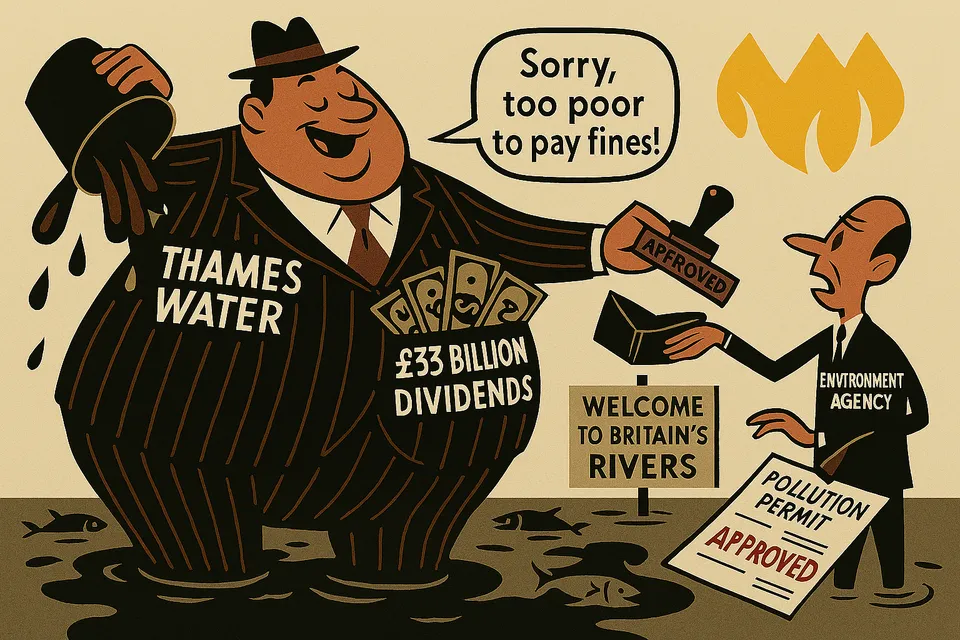The Sewage State: How England's Water Crisis Exposes Total Institutional Collapse

The UK's water crisis is a textbook case of how privatized monopolies plunder public goods
English water companies dumped raw sewage into rivers and seas at record-breaking levels in 2024, with serious pollution incidents surging 60% in a single year. While politicians promised a crackdown on water pollution, the reality is stark: 75 serious incidents poisoned waterways last year, up from 47 in 2023.
Commentary Based On
The Guardian
Serious pollution incidents by English water companies rose 60% last year
Thames Water alone was responsible for 33 serious pollution incidents - more than doubling their environmental crimes from 14 to just one year. These aren’t minor infractions. These are catastrophic events causing mass fish deaths and persistent ecological damage.
The Accountability Vacuum
Here’s where institutional failure becomes farce: Thames Water’s CEO Chris Weston had the audacity to ask Parliament to waive fines for poisoning England’s waterways. His argument? The company can’t afford to pay penalties while trying to “turn around financially.”
Translation: We’ve extracted billions in dividends for shareholders, loaded the company with debt, and now expect the public to accept sewage in their rivers as the price of our financial engineering.
The Environment Agency admits there are now “too many environmental offences to prosecute every wastewater company.” When criminality becomes so widespread that law enforcement gives up, you’re witnessing state failure in real-time.
The £12 Billion Deception
Water companies promise to spend £12 billion over five years to “upgrade” sewerage systems. The reality buried in the Public Accounts Committee report? This massive sum will fix only 44% of sewage overflows.
Let that sink in: After spending £12 billion of bill-payers’ money, the majority of raw sewage outlets will continue pumping human waste into rivers and seas. This isn’t investment - it’s managed decline with a price tag.
Pattern Recognition: Privatization’s End Game
The water crisis exemplifies Britain’s broader institutional rot:
- Regulatory Capture: The Environment Agency is reduced to documenting crimes it cannot prosecute
- Financial Engineering Over Public Service: Companies prioritize debt servicing and dividends while infrastructure crumbles
- Accountability Theatre: Fines become optional when companies claim poverty after years of profit extraction
- Normalization of Failure: 2,801 total pollution incidents in 2024 is treated as business as usual
The Special Administration Shell Game
River Action’s call for Thames Water to enter “special administration” reveals the next phase of this scam. After decades of profit extraction, taxpayers will likely bail out these failed monopolies, socializing losses after privatizing gains.
Meanwhile, an £11 million fund created from water company fines sits undistributed - bureaucratic paralysis preventing even token environmental improvements while rivers die.
What This Really Means
For UK citizens, the message is clear: Your rivers are corporate profit centers first, natural resources second. The same institutions that promise to protect public health and the environment are complicit in their systematic destruction.
Southern Water’s response is particularly revealing - blaming “wet wipes, fats, oils and grease” for pollution while their infrastructure fails. Classic British institutional behavior: blame the public for systemic failures while collecting monopoly rents.
The Decline Accelerates
This isn’t just about dirty rivers. It’s about a country where:
- Basic infrastructure doesn’t function
- Monopolies operate with impunity
- Regulators document crimes they won’t prosecute
- Politicians enable corporate capture of public goods
- Citizens pay twice - once in bills, again in environmental destruction
The 60% surge in serious pollution incidents isn’t an anomaly - it’s acceleration. As institutions weaken, failures cascade. Today it’s sewage in rivers. Tomorrow it’s broader infrastructure collapse.
Britain’s water crisis proves a fundamental truth: When accountability dies, so do rivers. And when rivers die, they take civilizations with them.
Commentary based on Serious pollution incidents by English water companies rose 60% last year by Helena Horton on The Guardian.